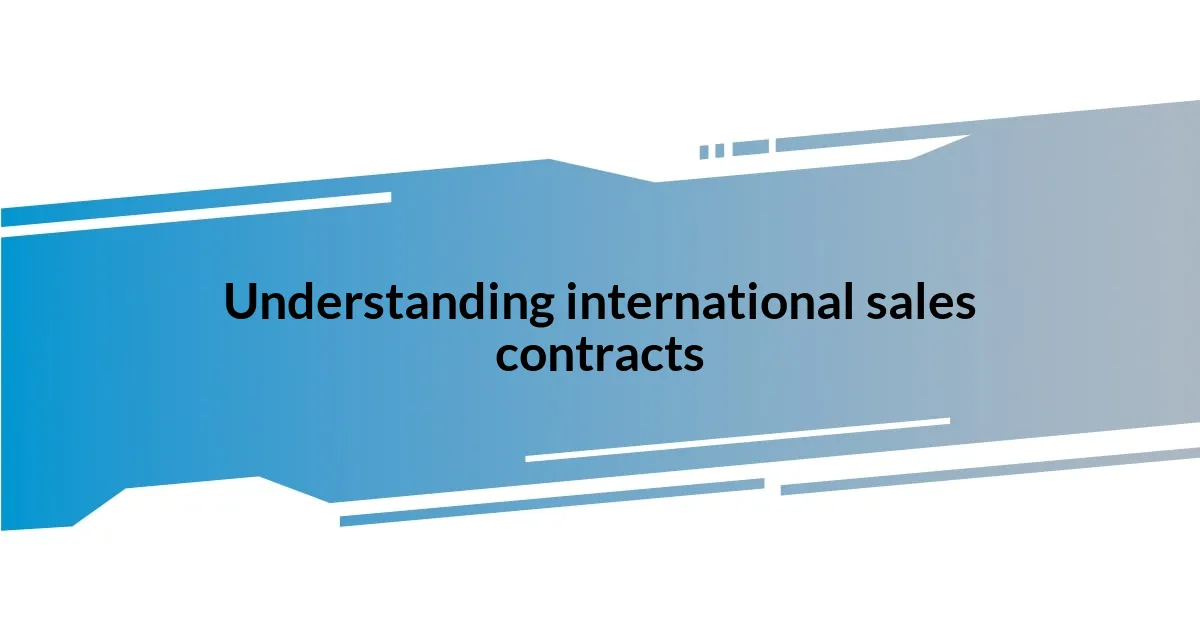Key takeaways:
- Clarity in language and contract terms is vital to avoid misunderstandings and disputes in international sales.
- Establishing trust and understanding cultural nuances is crucial for effective negotiations and long-term partnerships.
- Proactive risk management, including compliance with laws and detailed documentation, protects against potential issues and strengthens relationships.

Understanding international sales contracts
Understanding international sales contracts can feel overwhelming at first, but they are crucial in defining the terms of trade across borders. When I first delved into this world, I remember feeling a mix of excitement and apprehension—you really start to grasp the complexities involved. What struck me most was the importance of clarity; even the smallest ambiguity in a contract can lead to significant misunderstandings later on.
One time, while negotiating a contract with a supplier overseas, I learned just how critical the choice of language could be. Our initial draft was filled with industry jargon that seemed fine to me but left my partner confused. It dawned on me then that a contract should bridge gaps, not create them. How often do we overlook the simple fact that what makes perfect sense to one party might be completely baffling to another?
In addition to clear language, I’ve found that understanding the legal implications in different jurisdictions is vital. There was a moment when a delivery delay raised questions about liability and penalties; I realized that the laws governing contracts can vary dramatically from one country to another. Have you ever found yourself second-guessing the terms you’ve set? This experience taught me that being proactive in understanding international laws can safeguard against potential pitfalls, saving both time and frustration down the line.

Key components of sales contracts
The key components of sales contracts are essentially the backbone of any successful international transaction. From my experience, the most critical elements include the parties’ details, subject matter, pricing, delivery terms, and payment conditions. I once encountered a situation where overlooking the specifics of the product description led to a dispute over quality; clear definitions can save you from unnecessary heartache.
Equally important are the terms regarding dispute resolution. Having a mechanism for handling conflicts is non-negotiable. I remember a case where my company’s interests were compromised simply because we failed to mention jurisdiction in our agreement. It was a pivotal moment that highlighted how essential it is to have a clear path for resolving disagreements—not just for legal clarity but also for fostering a collaborative relationship.
Payment terms are another critical factor, including methods, currency, and timelines. During one negotiation, I insisted on a letter of credit, which provided both sides with security. It was a game-changer for building trust with my international partners and alleviating the anxiety that often accompanies cross-border transactions.
| Key Component | Description |
|---|---|
| Parties’ Details | Information about the buyer and seller. |
| Subject Matter | Clear description of goods or services involved. |
| Pricing | Price per unit, total price, and possible adjustments. |
| Delivery Terms | Details about delivery method, responsibilities, and timelines. |
| Payment Conditions | Agreed methods, currency, and payment schedule. |
| Dispute Resolution | How disputes will be managed, including jurisdiction. |

Negotiating terms effectively
When it comes to negotiating terms effectively, I’ve found that preparation is everything. Before entering discussions, I always do my homework—understanding not just market conditions but also the cultural nuances of the other party. I recall a negotiation with a distributor in Asia; my research into their business etiquette revealed that building personal rapport was just as crucial as discussing the deal terms. It taught me that a friendly approach can often lead to more fruitful outcomes than a purely transactional mindset.
Here are a few strategies I’ve learned over the years:
- Listen Actively: Pay attention to the other party’s needs and concerns. Their perspective can provide valuable insights that may help in tailoring a mutually beneficial agreement.
- Be Flexible: While you have your goals, being open to adjustments can create goodwill and facilitate smoother negotiations.
- Clarify Expectations: Always confirm that both sides have the same understanding of key terms to avoid miscommunication later.
- Employ a Win-Win Approach: Aim for solutions that benefit both parties. It’s about building a long-term relationship, not just winning a single deal.
- Document Everything: Never rely on verbal agreements alone. Drafting clear terms helps avoid disputes and misinterpretations.
Establishing a cooperative atmosphere while negotiating can transform the process from confrontational to collaborative. During one intense negotiation, I shifted the dynamics simply by suggesting we review the terms together, marking notes and proposing alternatives as we went along. The pressure dissipated, and by the end, we both walked away with a sense of accomplishment and partnership rather than having just executed a transaction.

Managing risks in contracts
Managing risks in contracts is a nuanced endeavor that requires careful thought and proactive measures. I recall a tense moment during a contract negotiation where I insisted on including a clause for force majeure—a safeguard against unforeseen events. This detail might seem small, but it created a massive peace of mind, especially when unexpected political instability arose in the buyer’s country months later. Wouldn’t you agree that anticipating potential disruptions ahead of time is key to protecting your interests?
In my experience, it’s essential to consider detailed insurance provisions too. I once overlooked this aspect, and it backfired when an accident occurred during shipping. The financial implications were significant, highlighting how vital it is to specify clearly who bears responsibility in such cases. Having a well-defined risk allocation strategy can save not just money but also headaches down the line. How often do we take for granted the little things until they bite us?
Moreover, ongoing communication is the bedrock of effective risk management. I remember a partnership where regular check-ins helped us spot potential risks before they morphed into real problems. By keeping the lines open, both parties felt empowered to voice concerns. It became a team effort rather than a reluctant obligation. Don’t you think that cultivating this kind of openness fosters trust and ultimately strengthens the business relationship?

Compliance with international laws
Ensuring compliance with international laws can feel like navigating a maze, but I’ve discovered that it’s pivotal for maintaining a solid business reputation. In one instance, I was knee-deep in finalizing a sales contract when I stumbled upon a regulation regarding export licenses in the target market. It was a last-minute realization that could have derailed our entire deal. Has that happened to you? Sometimes, it’s those unexpected hurdles that remind us how crucial research really is—ensuring that every country’s laws are understood and respected can save you from potential litigation.
Moreover, I remember a time when we faced a challenge with customs compliance and learned the hard way that documentation is everything. A slight error on our shipping papers resulted in a delay that not only cost us time but also strained our relationship with the client. It wasn’t just about the paperwork; it was a wake-up call about the broader implications of our oversight. This experience reinforced my belief that thorough checks and acknowledgments of both the legal and procedural frameworks are essential to foster trust and smooth operations.
What I’ve learned from these instances is that compliance isn’t just a box to tick off; it’s an ongoing commitment that reflects your company’s integrity. When I initiated a compliance training program for my team, I noticed a shift in our approach—people began to appreciate the importance of aligning our business practices with international laws. It created a culture of accountability and awareness that, I believe, not only enhanced our operational efficiency but also empowered my colleagues. After all, wouldn’t you agree that an empowered team is far better equipped to navigate the complexities of global commerce?

Common pitfalls to avoid
One common pitfall that I’ve encountered is the failure to clearly outline terms of payment. I remember a tense situation where my buyer expected a 30-day payment term, but our contract specified 60 days. The misalignment created frustration on both sides and nearly jeopardized the deal. Have you ever found yourself in a similar bind? Being on the same page financially is crucial, as misunderstandings can sour even the best of intentions.
Another stumbling block I’ve noticed is neglecting to address dispute resolution in detail. In one instance, a minor disagreement escalated because we hadn’t defined our approach to resolving issues. It was a painful lesson that a well-thought-out clause specifying mediation or arbitration can save time and stress. Isn’t it fascinating how marking clear paths for conflict can actually strengthen relationships?
Finally, I’ve learned the hard way that overlooking cultural differences can be a significant setback. During a negotiation with an overseas partner, I unintentionally offended them by not considering their customs and approaches to business. The awkwardness that followed was eye-opening. Wouldn’t you agree that showing respect for cultural nuances not only enhances communication but also builds lasting partnerships? Being culturally aware is not just a nice-to-have; it’s essential in international dealings.

Lessons learned from my experience
What stands out in my journey is the importance of clarity in all communications. There was a time when I assumed our supplier understood the exact specifications for a product we were ordering. To my dismay, what I received was a far cry from what we needed. This misunderstanding not only delayed our delivery but also amplified stress within my team. Have you encountered a similar miscommunication? It’s moments like these that emphasize the value of expressing every detail, no matter how seemingly trivial.
I also learned about the impact of trust in international sales. I once worked with a client who was hesitant to finalize a contract due to previous bad experiences. After months of building rapport through open discussions, we finally reached an agreement. The sense of relief and accomplishment we both felt was palpable. Have you ever experienced that moment where trust turns a wary partnership into a fruitful collaboration? It became clear to me then that establishing trust is foundational, often requiring patience and genuine concern for the other party’s needs.
Lastly, embracing flexibility has proven crucial. I remember a case where unexpected changes in regulations required us to pivot our strategy virtually overnight. Initially, I was frustrated—change is never easy. However, once I adapted and rallied my team to brainstorm solutions, we not only met our commitments but also discovered new opportunities. Isn’t it interesting how challenges can, if approached with the right mindset, lead to growth? This resilience has shaped my approach to international contracts, reminding me that flexibility often paves the way for innovative outcomes.
